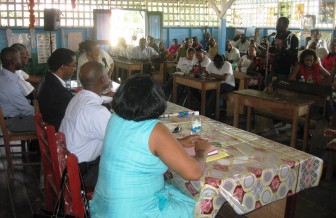At a meeting held at the Skeldon High School Annex at Corriverton yesterday, residents listened to the People’s National Congress Reform’s (PNCR) presidential hopefuls as they outlined their plans to improve Berbice.
The nominees: Dr. Faith Harding, David Granger, attorneys-at-law Basil Williams and James Bond and Carl Greenidge in response to questions from the gathering, said they would take Berbice forward by tackling crime, cross-border smuggling, unemployment and school drop-outs.
The meeting, moderated by parliamentarian and central executive member of the PNC/R Volda Lawrence, was the third of its kind held since the names of the candidates were announced. Another meeting was later held at the Manchester Secondary School.
In her address, Dr. Harding said that her campaign is about creating jobs since that was the concern of many persons in Berbice.
She promised that in the next few weeks she would present a 100-page document that would outline the micro-financing strategies and activities of job creation.
This, she said, would include institutions like the World Bank, the Inter-American Development Bank and government agencies that would “bring money to the pockets of women” and creating the livelihoods that they want.

She said too that in her campaign she would ask the people to look at developing the resources they have at their disposal.
Granger, a historian and retired army Brigadier, mentioned the decline of the Skeldon Sugar Factory, the rampant piracy along the coast, migration, contraband smuggling and school drop outs as some of the issues affecting Berbicians.
He said though he has a “bright idea” and “has a plan that is based on ensuring that there is maximum employment for residents of Region Six.
According to him “every day children drop out of school and many of them would be unemployed and would be forced to sit idly in the villages along the coast.”
He pointed out that the education system has let the children down but
his “top priority is to ensure that every Guyanese child finds a place in school” even if he has to provide them with uniform, meals and transportation.
“We have to make sure that once again Guyana would become an education nation,” thus “making Guyanese fully employed in helping to expand the economy.”
Williams told the gathering that his “vision for Guyana is for a balanced economy both nationally and regionally…. not only for the young people but for all the workers of Guyana.”
He would also like to see a “society that is tolerant” and is confident that there would be “meaningful change on this coastland.”
Williams who envisaged that the “oil exploration would produce results that would escape our imagination,” noted that “even if we have to do so with Suriname I have no difficulty with that…”
In presenting his plans, Bond, 31 said his vision is to “make the small man the big man.”
He pointed out that “a man cannot be a big man if he does not own his own plot of land” in order to access loans and develop himself, his family, community and the country.”
According to Bond, “If you are a small man and you are producing you have to be able to have markets for your production.”
He mentioned that a farmer may go to the market and just earn $500 for a big bag of boulanger and a young mother may earn just $100 for a parcel of bora.
He charged that “this is an insensitive government that would want to keep the small man a small man.”
He said the slogan “Youth with a Vision; Vision with youth…” means that behind the guiding hands of experience there are “youths with energy and vibrancy.”
He remarked: “The PNCR cannot win an election without young people…My campaign strategy is to have the involvement of young people, not by song and dance and jump up… but to make them “part and parcel of the development plans of this country.”
He promised to empower them under marketing – with government taking the role, manufacturing – by setting up agro-processing plants around the country and management – through conducting training.
Greenidge’s vision is to first build a vibrant party. He said that “we are in a country where corruption is rampant, favouritism is the norm and incompetence as evidenced by the Skeldon Sugar plant… and we have a don’t care government.”
On the economic front, he said “one needs to pay attention to growth and the generation of jobs,” investment and employment.
He also mentioned the need for investment in human resources in the workplaces so as to improve productivity.





